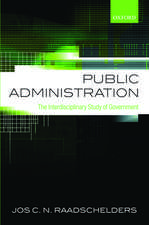Institutional Learning and Knowledge Transfer Across Epistemic Communities: New Tools of Global Governance: Innovation, Technology, and Knowledge Management, cartea 13
Autor Elias G. Carayannis, Ali Pirzadeh, Denisa Popescuen Limba Engleză Paperback – 25 ian 2014
Prevailing characteristics of the global economic systems, such as the increasing power of financial institutions, changes in the structure of global production, decline in the authority of nation-states over their national economy, and creation of global institutional setting, e.g., global governance have created the conditions for a naturally evolving process towards enabling national epistemic communities to create institutions that comply with global rules and regulations can control crises.
In this context, transfer of technical knowledge from the larger organizations and its global epistemic communities to member communities is becoming a policy tool to “convince” participants in the international system to have similar ideas about which rules will govern their mutual participation. In the realm of finance and banking regulation, the primary focus is on transfer of specialized and procedural knowledge in technical domains (such as accounting procedures, payment systems, and corporate governance principles), thereby promoting institutional learning at national and local levels. In this volume, the authors provide in-depth analysis of initiatives to demonstrate how this type of knowledge generated at the internationalorganization level, is codified into global standards, and disseminated to members, particularly in the developing world, where the legal and regulatory infrastructure is often lacking.
They argue that despite the challenges, when a country intends to join the global system, its institutions and economic structures need to move toward the global norms. In so doing, they shed new light on the dynamics of knowledge transfer, financial regulation, economic development, with particular respect to supporting global standards and avoiding future crises.
| Toate formatele și edițiile | Preț | Express |
|---|---|---|
| Paperback (1) | 637.46 lei 6-8 săpt. | |
| Springer – 25 ian 2014 | 637.46 lei 6-8 săpt. | |
| Hardback (1) | 643.65 lei 6-8 săpt. | |
| Springer – 24 noi 2011 | 643.65 lei 6-8 săpt. |
Din seria Innovation, Technology, and Knowledge Management
- 15%
 Preț: 643.99 lei
Preț: 643.99 lei -
 Preț: 281.97 lei
Preț: 281.97 lei - 18%
 Preț: 954.62 lei
Preț: 954.62 lei - 15%
 Preț: 653.14 lei
Preț: 653.14 lei - 18%
 Preț: 945.62 lei
Preț: 945.62 lei - 18%
 Preț: 890.54 lei
Preț: 890.54 lei - 15%
 Preț: 640.06 lei
Preț: 640.06 lei -
 Preț: 383.93 lei
Preț: 383.93 lei - 15%
 Preț: 633.02 lei
Preț: 633.02 lei - 18%
 Preț: 1124.60 lei
Preț: 1124.60 lei - 18%
 Preț: 956.81 lei
Preț: 956.81 lei -
 Preț: 389.49 lei
Preț: 389.49 lei - 15%
 Preț: 655.13 lei
Preț: 655.13 lei - 20%
 Preț: 570.97 lei
Preț: 570.97 lei - 15%
 Preț: 642.03 lei
Preț: 642.03 lei - 18%
 Preț: 941.50 lei
Preț: 941.50 lei - 15%
 Preț: 643.00 lei
Preț: 643.00 lei - 18%
 Preț: 732.52 lei
Preț: 732.52 lei - 15%
 Preț: 637.59 lei
Preț: 637.59 lei - 18%
 Preț: 890.06 lei
Preț: 890.06 lei - 15%
 Preț: 635.47 lei
Preț: 635.47 lei - 15%
 Preț: 638.57 lei
Preț: 638.57 lei -
 Preț: 391.99 lei
Preț: 391.99 lei -
 Preț: 391.99 lei
Preț: 391.99 lei - 15%
 Preț: 632.22 lei
Preț: 632.22 lei - 20%
 Preț: 584.75 lei
Preț: 584.75 lei - 15%
 Preț: 642.18 lei
Preț: 642.18 lei - 18%
 Preț: 894.16 lei
Preț: 894.16 lei - 18%
 Preț: 943.73 lei
Preț: 943.73 lei - 15%
 Preț: 644.49 lei
Preț: 644.49 lei - 18%
 Preț: 947.85 lei
Preț: 947.85 lei - 15%
 Preț: 656.89 lei
Preț: 656.89 lei - 18%
 Preț: 954.45 lei
Preț: 954.45 lei - 18%
 Preț: 1006.72 lei
Preț: 1006.72 lei - 18%
 Preț: 727.31 lei
Preț: 727.31 lei - 15%
 Preț: 642.51 lei
Preț: 642.51 lei - 18%
 Preț: 953.65 lei
Preț: 953.65 lei - 15%
 Preț: 639.59 lei
Preț: 639.59 lei - 15%
 Preț: 645.47 lei
Preț: 645.47 lei - 18%
 Preț: 952.26 lei
Preț: 952.26 lei - 15%
 Preț: 639.08 lei
Preț: 639.08 lei
Preț: 637.46 lei
Preț vechi: 749.95 lei
-15% Nou
Puncte Express: 956
Preț estimativ în valută:
121.97€ • 127.36$ • 100.72£
121.97€ • 127.36$ • 100.72£
Carte tipărită la comandă
Livrare economică 15-29 aprilie
Preluare comenzi: 021 569.72.76
Specificații
ISBN-13: 9781493902316
ISBN-10: 1493902318
Pagini: 236
Ilustrații: XII, 224 p.
Dimensiuni: 155 x 235 x 12 mm
Greutate: 0.34 kg
Ediția:2012
Editura: Springer
Colecția Springer
Seria Innovation, Technology, and Knowledge Management
Locul publicării:New York, NY, United States
ISBN-10: 1493902318
Pagini: 236
Ilustrații: XII, 224 p.
Dimensiuni: 155 x 235 x 12 mm
Greutate: 0.34 kg
Ediția:2012
Editura: Springer
Colecția Springer
Seria Innovation, Technology, and Knowledge Management
Locul publicării:New York, NY, United States
Public țintă
ResearchTextul de pe ultima copertă
Over the past several decades, as the pace of globalization has accelerated, operational issues of international coordination have often been overlooked. For example, the global financial crisis that began in 2007 is attributed, in part, to a lack of regulatory oversight. As a result, supranational organizations, such as the G-20, the World Bank, and the International Monetary Fund, have prioritized strengthening of the international financial architecture and providing opportunities for dialogue on national policies, international co-operation, and international financial institutions.
Prevailing characteristics of the global economic systems, such as the increasing power of financial institutions, changes in the structure of global production, decline in the authority of nation-states over their national economy, and creation of global institutional setting, e.g., global governance have created the conditions for a naturally evolving process towards enabling national epistemic communities to create institutions that comply with global rules and regulations can control crises.
In this volume, the authors provide in-depth analysis of initiatives to demonstrate how this type of knowledge generated at the international organization level, is codified into global standards, and disseminated to members, particularly in the developing world, where the legal and regulatory infrastructure is often lacking.
They argue that despite the challenges, when a country intends to join the global system, its institutions and economic structures need to move toward the global norms. In so doing, they shed new light on the dynamics of knowledge transfer, financial regulation, economic development, with particular respect to supporting global standards and avoiding future crises.
Prevailing characteristics of the global economic systems, such as the increasing power of financial institutions, changes in the structure of global production, decline in the authority of nation-states over their national economy, and creation of global institutional setting, e.g., global governance have created the conditions for a naturally evolving process towards enabling national epistemic communities to create institutions that comply with global rules and regulations can control crises.
In this volume, the authors provide in-depth analysis of initiatives to demonstrate how this type of knowledge generated at the international organization level, is codified into global standards, and disseminated to members, particularly in the developing world, where the legal and regulatory infrastructure is often lacking.
They argue that despite the challenges, when a country intends to join the global system, its institutions and economic structures need to move toward the global norms. In so doing, they shed new light on the dynamics of knowledge transfer, financial regulation, economic development, with particular respect to supporting global standards and avoiding future crises.
Caracteristici
Applies a new perspective to issues of financial regulation and governance in the globalized world, with an emphasis on knowledge transfer Includes in-depth cases studies of successful initiatives around the world, including Kazakhstan, the West Indies, and Latin America Appropriate for graduate-level courses in knowledge management, financial regulation and governance, public policy, political economy, and international relations Includes supplementary material: sn.pub/extras












